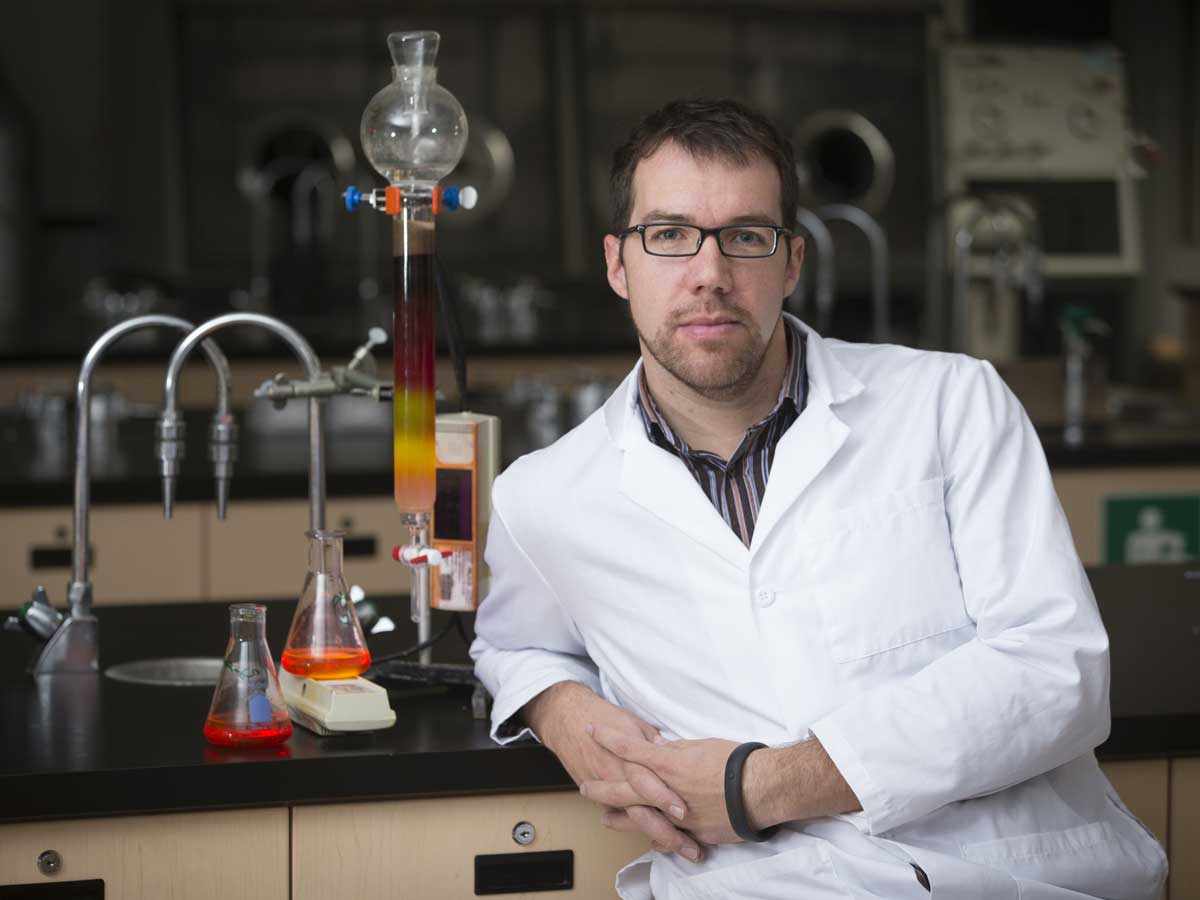Come, experiment at the new Science Discovery Zone

Photo: Bryan Koivisto is the director of the Science Discovery Zone.
The Science Discovery Zone (opens in new window) (SDZ) at Ryerson offers space for students to be innovative and benefit from mentoring. The zone opened recently under the guidance of the Office of Zone Learning (opens in new window) and the Faculty of Science (opens in new window) . Director Bryan Koivisto is a professor in the Faculty of Science and the principal investigator at The Koivisto Lab for Advanced Solar Design & Innovation (opens in new window) . Ryerson Today interviewed Koivisto to learn more about this new zone and to find out how students can get involved.
Why was the SDZ created?
The SDZ was created to provide a space on campus for students to be innovative without feeling the need to start a company. The zone focuses on an evidence-based approach to innovation, which starts with a hypothesis and continues through a cycle of design experimentation, testing and insight. This approach is akin to the scientific method, a process of experimentation that is commonly used in science, technology, engineering and mathematics.
What is SDZ’s mission?
Our motto/mission is “connecting science to value.” We recognize that value means different things to different people, so we asked the community what they wanted from their zone experience. After more than 350 hours of consultation with various stakeholders, the SDZ listened and has committed itself to:
1. Engaging more faculty and staff for mentorship and unique programming;
2. Developing a space for young people to be innovative without feeling the pressure to start a company;
3. Building a physical lab space where members can validate and prototype their scientific inventions/discovery; and,
4. Partnering with the public-private sector so students can help solve real-world corporate challenges.
What is unique about the SDZ?
From a young age in science, technology, engineering and mathematics fields, students are taught that there are right and wrong answers. This is an unfortunate reality of our education and assessment structure.
At the SDZ, we believe that breakthroughs are realized through countless failures and misconceptions that lead to discovery. In other words, scientific knowledge only exists because of failure, and observation. Unfortunately, this assessment strategy has led to a timid and risk-averse segment within our innovation wheelhouse, and ironically some of the brightest minds fear taking entrepreneurial risks because they are afraid of failure.
Conversely, in business, the mantra is “fail fast, fail often” because failure is how we all learn. The SDZ will be a safe place to fail – without judgement – we want our members to embrace failure and understand that critical thinking, discovery, innovation and failure go hand-in-hand.
Is the SDZ already incubating projects and businesses? If so, which ones and what is their community impact?
Yes, we are. The startups and projects currently at SDZ include:
· uBioDiversity: a company that uses sequencing technology to catalogue bacterial populations and provides customer recommendations for a healthier microbiome;
· SARA: a project that uses social media to deliver educational content to students;
· Microbe Hub: a team that produces composting kits to encourage students to establish a vermicomposting system in their school; and
· KBox: a project that revitalizes the everyday lunchbox to maintain a warm and cold compartment.
What resources does the SDZ offer to its members? Are there mentors that students can work with? Who are they?
The SDZ runs like a startup, and we view young innovators (students), mentors and industry partners as our customers (members). Our zone encourages collaboration among all members in order to innovate at an extraordinary pace. We believe our community is one of our greatest resources, which includes a diverse mix of students, alumni, faculty, staff, business leaders and entrepreneurs. Our on-campus working space and lab space are also great resources for our members to experiment, collaborate and learn from one another.
Can students without a background in science join the SDZ?
Absolutely — anyone is welcome to join the SDZ. In fact, only 50 percent of our members are based in the Faculty of Science. Everyone is welcome, and we continue to recruit interested mentors and students from all faculties.
What is the Food Innovation Hub and how is it affiliated with the SDZ?
The Food Innovation Hub is an accelerator that works with startups worldwide to rethink and reshape the future of food. It is a Ryerson accelerator that has partnered with the SDZ based on our shared interests in design thinking (evidence-based innovation) and improvement of our food ecosystem.
How can students get involved with the SDZ? Are there any upcoming events?
If students are interested in taking advantage of the SDZ to explore an idea or find a mentor, the first step is completing one of our application forms: (google form) The Science Discovery Zone Individual Application (external link, opens in new window) or (google form) The Science Discovery Zone Idea/ Project Submission (external link, opens in new window) .
The SDZ will be hosting an alumni mentoring event and open house in April 2017. Monthly events are also planned, where we will investigate the challenges and opportunities for innovation in Canada over the next 50 years. From food to medical marijuana to mental wellness to privacy and security, we are going to have something for everyone.
Another way that students can get involved is by enrolling in the RySciMatch (opens in new window) program through The Chang School. The Faculty of Science runs this program every winter, and this year the SDZ will also be involved. This non-credit course is open to all undergraduate students who are interested in acquiring research experience through mentors including senior undergraduates, faculty and external industry partners.
To learn more, please visit the Science Discovery Zone (opens in new window) website.